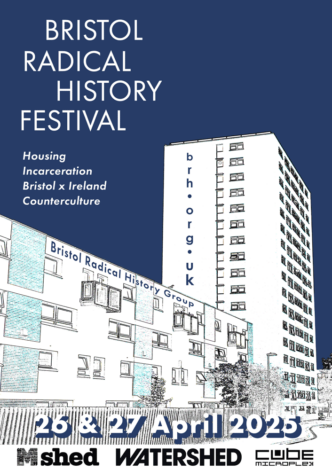Paul Smith’s talk will draw on his research into the history of Hartcliffe, designed by planners in the 1940s on the garden city model, built as a housing estate in the 1950s. This tale of the steady removal of planned facilities and the reduction in the quality of homes presented huge challenges to a community of ‘pioneers’ exported to the outskirts of the city. The story of Hartcliffe was repeated across the country as estates were built on the edges of towns and cities. This story has […]
After the financial crash of 1929 and during the years of the 'great depression' in the 1930s, the Ministry of Labour in Britain introduced a series of 'instructional camps' for the long-term unemployed, which were supported by successive governments. Over 150,000 men from 'distressed areas' were sent to do hard labour in these remote settlements. Using contemporary images and excerpts of oral history from the film Old Hands this talk explains the nature of these camps, how they functioned and […]
70 mins – 2020 (Dir. Christopher Reeves) Introduced and Q&A with Ann Field (SOGAT official during the strike). A film about the momentous year-long industrial dispute which began in 1986 when Rupert Murdoch plotted to move production of his papers overnight from central London’s Fleet Street to a secretly equipped and heavily guarded plant at Wapping, a docklands district in east London. 5,500 men and women lost their jobs and centuries of tradition in one of London’s last manufacturing […]
In this audio/visual talk Richard Jones makes the case for Bristol Counter Culture of the 1980s thriving on neglect and follows a thread from the St Paul’s uprisings to the Wild Bunch, the Dug Out club, punk, the Battle of the Beanfield, street art in Barton Hill to the emergence of Banksy.
In 1979 the new Tory government led by by Margaret Thatcher and Home Secretary, Willie Whitelaw, abolished borstals for young offenders and introduced a new system of 'youth detention centres' employing harsh, quasi-military discipline. They proudly claimed in their party manifesto that they were going to "experiment with a tougher regime as a short, sharp shock for young criminals". Using a series of fascinating images taken inside two such institutions in the mid 1980s, Glenochil and […]
High-rise housing has been held up in the mainstream media as the tombstone of welfare state: a symbol of the failure of state-led reform. But does this map onto residential opinion on the ground – or, more accurately, up in the air? Based on years of historical research of grassroots struggles on a range of estates, this talk explores how multi-storey housing served as a crucible for the welfare state’s reimagination. It illustrates the resilience of investments in public housing: throughout […]
Steve Hunt, author of Bristol Radical History Group book, Yesterday’s To-morrow: Bristol’s Garden Suburbs, will tour us through the principles and practical impact of the garden-city movement in our city. The 1918 Tudor Walters Report came with the well-known aspiration to build “homes fit for heroes” after the First World War. The interwar council housing boom that followed shaped much of the development of Bristol as we know it today. It aimed to create new neighbourhoods based on high-quality […]
John Boughton’s talk will cover the early history of public housing from the almshouses and parish housing of pre-industrial times to the council housing of the interwar period. As the Industrial Revolution came to transform Britain’s economy and society and democratic forces grew, Victorian elites came slowly to accept the inevitability of state intervention in housing. John will discuss the forces that shaped council housing in the later nineteenth century and the ideals motivating housing […]
Ireland is one of the few countries in Europe that escaped fascist rule in World War Two and where neo-Nazi parties have never enjoyed success. Yet over the last decade Ireland, north and south, has seen a new wave of far-right street demonstrations, arson attacks, and racist violence. Historian and best-selling author Pádraig Óg Ó Ruairc's new book BURN THEM OUT! A history of fascism and the far-right in Ireland exposes for the first time the hidden histories of the hate filled ideologies […]
 Not A BRHG Event
Not A BRHG Event
Professor of Modern British History, June Hannam shares the inspiring journey of Annie Townley, a Lancashire textile worker turned suffragette and Labour Party organiser. This talk highlights the challenges and opportunities for working-class women in activism, focusing on Townley’s personal and emotional struggles within the suffrage and labour movements. It has been arranged by the Bristol Radical History Group.

